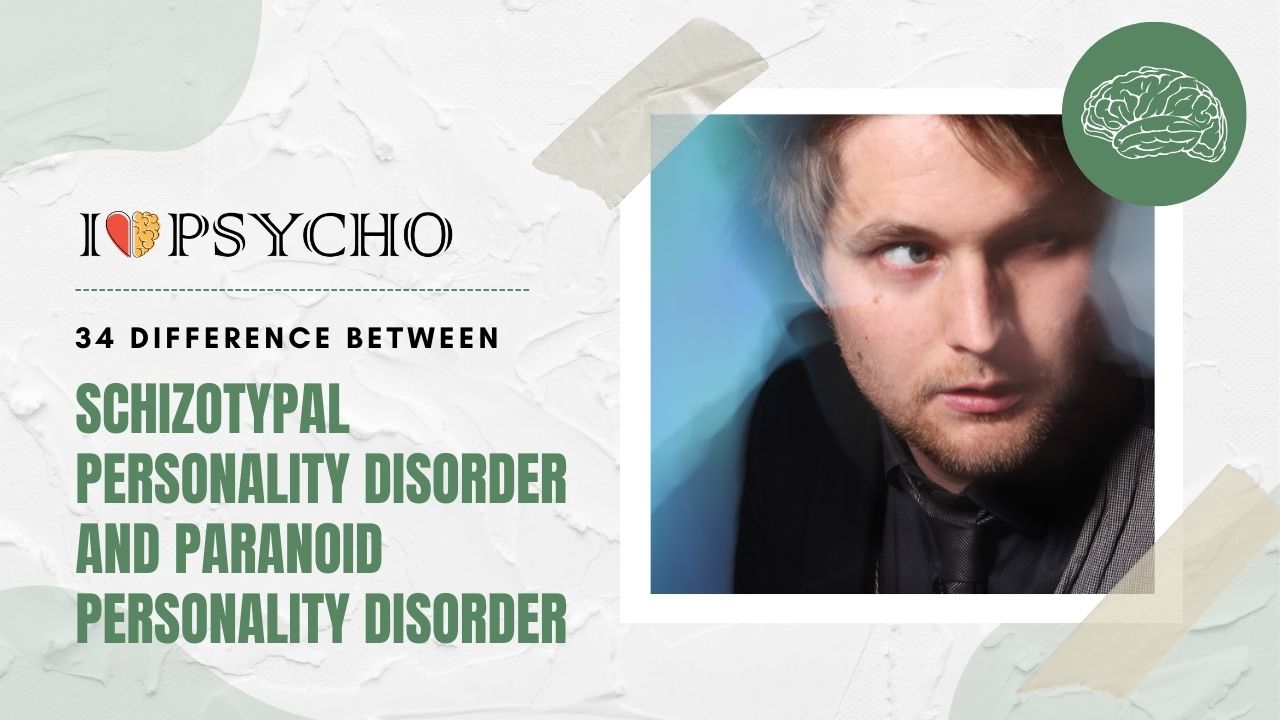Schizotypal Personality Disorder (STPD) and Paranoid Personality Disorder (PPD) are separate clinical illnesses with different diagnostic criteria. Although both are cluster A personality disorders in the Diagnostic and Statistical Manual of Mental Disorders (DSM-5), their symptoms, behaviors, and psychological causes differ.
Unusual behavior, cognitive processes, and social deficiencies characterize STPD. STPD patients demonstrate magical thinking, unusual ideas, and visual abnormalities, similar to mild schizophrenia. Their social anxiety and paranoia may make it hard to build deep connections. STPD allows unconventional speech, strange clothes, and superstitious practices, unlike PPD, which includes widespread suspicion. They have more fanciful cognitive distortions.
In contrast, PPD is characterized by persistent distrust. Even when they’re wrong, PPD sufferers are hypervigilant for betrayal, dishonesty, and injury. They carry grudges for long durations and are sensitive to slights. STPD patients may act eccentrically, whereas PPD patients usually behave and communicate normally. Protection from imagined interpersonal risks is their main emphasis.
They also have different causes and psychological mechanisms. A family history of schizophrenia or comparable diseases suggests a genetic risk of STPD. However, early-life betrayal or distrust may cause PPD and defensive coping methods. The treatments differ too. Interventions for anxiety, cognitive distortions, and social skills may help STPD patients. PPD treatment emphasizes trust, paranoia, and interpersonal skills.
Since Schizotypal Personality Disorder and Paranoid Personality Disorder are cluster A personality disorders, they differ in their cognitive distortions, interpersonal behaviors, and causes. Correct diagnosis and treatment planning can lead to more personalized and focused treatments to enhance the quality of life and functioning of people with these conditions.
|
S.No. |
Aspect |
Schizotypal Personality Disorder |
Paranoid Personality Disorder |
|
1 |
Type of Disorder |
Personality Disorder |
Personality Disorder |
|
2 |
Core Features |
Odd or eccentric behavior and beliefs |
Pervasive distrust and suspicion |
|
3 |
Social Interactions |
Difficulty forming close relationships |
Suspicious of others’ motives |
|
4 |
Cognitive Patterns |
Magical thinking, odd beliefs |
Preoccupied with hidden motives |
|
5 |
Reality Distortion |
May have mild perceptual distortions |
Generally lacks severe distortion |
|
6 |
Social Anxiety |
Often experiences social anxiety |
Not primarily driven by anxiety |
|
7 |
Cognitive Disorganization |
May exhibit cognitive disorganization |
Generally has organized thinking |
|
8 |
Beliefs in Paranormal |
May believe in paranormal phenomena |
Generally lacks belief in paranormal |
|
9 |
Suspiciousness |
Less focused on suspicion |
Centered on suspicion of others |
|
10 |
Emotional Expression |
May exhibit inappropriate affect |
Typically has appropriate affect |
|
11 |
Eccentric Behavior |
Odd dress, speech, and mannerisms |
Generally does not exhibit eccentric behavior |
|
12 |
Magical Thinking |
May have superstitious beliefs |
Typically lacks magical thinking |
|
13 |
Social Isolation |
Often socially isolated |
May isolate due to suspicion |
|
14 |
Reluctance to Confide |
May be hesitant to confide in others |
Reluctant to confide due to suspicion |
|
15 |
Cognitive Misinterpretation |
May misinterpret events and situations |
Often misinterprets benign actions |
|
16 |
Interpersonal Difficulties |
Difficulty maintaining relationships |
Difficulty trusting and getting along with others |
|
17 |
Perceived Threats |
May perceive threats from external sources |
Perceives threats from others |
|
18 |
Beliefs in Conspiracy |
May have conspiracy theories |
Often believes in conspiracies |
|
19 |
Sensitivity to Criticism |
Sensitive to criticism and rejection |
Sensitive to perceived slights |
|
20 |
Delusional Thinking |
May have mild delusional thinking |
Generally lacks delusional thinking |
|
21 |
Emotional Attachments |
May form unconventional attachments |
Difficulty forming close attachments |
|
22 |
Lack of Close Friends |
Often lacks close friends |
May have few close relationships |
|
23 |
Paranoia |
Mild paranoia or suspiciousness |
Pronounced paranoia and suspicion |
|
24 |
Reality Testing |
May have mild difficulty with reality testing |
Generally has intact reality testing |
|
25 |
Need for Validation |
May seek validation for unusual beliefs |
Less focused on seeking validation |
|
26 |
Treatment Approach |
Psychotherapy, social skills training |
Psychotherapy, cognitive-behavioral approaches |
|
27 |
Medication Usage |
May use antipsychotic medications |
Rarely uses antipsychotic medications |
|
28 |
Isolation from Reality |
Tends to have less severe isolation from reality |
Often feels isolated from others |
|
29 |
Emotional Range |
May exhibit a wider emotional range |
Typically has a narrower emotional range |
|
30 |
Self-Perception |
May have an unusual self-perception |
Generally has a more typical self-perception |
|
31 |
Delusions of Reference |
May have delusions of reference |
Less likely to have delusions of reference |
|
32 |
Cognitive Organization |
Often disorganized thinking patterns |
Generally has organized thinking |
|
33 |
Risk of Psychosis |
May have increased risk of psychosis |
Generally lower risk of psychosis |
|
34 |
Specific Diagnostic Criteria (DSM-5) |
Follows DSM-5 criteria for Schizotypal Personality Disorder |
Follows DSM-5 criteria for Paranoid Personality Disorder |
Frequently Asked Questions (FAQs)
Q1: Which symptoms distinguish STPD from PPD?
STPD, like moderate schizophrenia, is characterized by eccentric behavior, unusual beliefs, and perceptual abnormalities. STPD sufferers may struggle to build intimate connections owing to social anxiety and paranoia. Paranoid Personality Disorder (PPD) entails hypervigilance for treachery, dishonesty, or damage and pervasive suspicion of others. PPD patients look more traditional, but STPD patients may speak and act eccentrically.
Q2: Do STPD and PPD share anything despite their differences?
The DSM-5 classifies STPD and PPD as cluster A personality disorders, which are eccentric. Both diseases can cause social and interpersonal issues but for different causes. Both illnesses can also impede life functioning.
Q3: What causes these disorders? Are there common risk factors?
A family history of schizophrenia or kindred diseases suggests a hereditary vulnerability to Schizotypal Personality Disorder. In contrast, Paranoid Personality Disorder may arise from early-life betrayal or distrust, leading to protective coping methods. While their causes differ, genetic, environmental, and psychological variables can affect both illnesses.
Q4: What impact do these diseases have on relationships and society?
Due to eccentricity, social anxiety, and unusual views, STPD sufferers may have trouble making and keeping friends. Their social deficiencies might isolate them. However, people with PPD have trouble trusting others and may assume deception or betrayal. They are distrustful and protective, which can strain relationships.
Q5: What are the recommended treatments for STPD and PPD?
Different treatments are used for various illnesses. Social skills, anxiety, and cognitive distortions are commonly addressed in Schizotypal Personality Disorder treatments. CBT and social skills training may help. Paranoid Personality Disorder treatment emphasizes trust, confronting paranoid assumptions, and increasing interpersonal functioning. Engaging PPD patients in therapy requires a therapeutic partnership.









